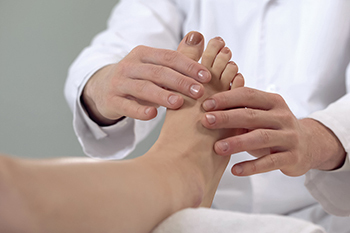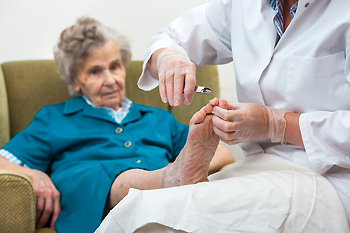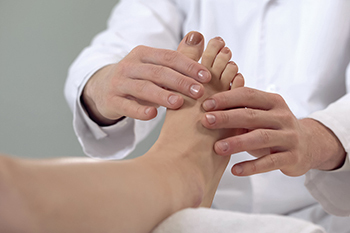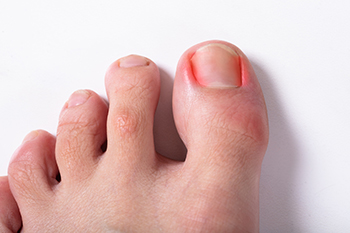Items filtered by date: September 2022
Why Are My Feet Swollen?

One can get swollen feet from walking or standing for long periods of time. The swelling is often relieved by resting and elevating the feet. Various other things can cause swelling in the feet, such as conditions with bones and tendons, problems with skin and toenails, or drug side effects. However, there are times when the swelling (or edema) is related to a more serious underlying problem like heart failure, developing blood clots, or kidney disease. So this must not be ignored. If you have swelling in your feet and you do not know the cause, or if the swelling worsens, causes pain, or interferes with mobility, contact a podiatrist immediately and have your feet examined. Swelling can be the first clue that something is going on in your body, and a proper diagnosis is imperative for effective treatment.
Swollen feet can be a sign of an underlying condition. If you have any concerns, contact one of our podiatrists of Summit Podiatry. Our doctors can provide the care you need to keep you pain-free and on your feet.
Swollen feet are a common ailment among pregnant women and people who stand or sit for extended periods. Aging may increase the possibility of swollen feet and patients who are obese often notice when their feet are swelling too. There may be medical reasons why swollen feet occur:
- Phlebitis - A condition that causes the veins to become inflamed and can also cause leg pain.
- Liver disease - This may lead to low blood levels of albumin which is a protein. This can cause fluid in the blood to pass into the tissues and several areas of the body can become swollen.
- Heart failure - When the heart doesn’t pump properly the blood that is normally pumped back to the heart can pool in the veins of the legs causing swollen feet.
- Kidney disease - One of the main functions of the kidneys is releasing excess fluid in the body. This type of condition can make it difficult for the kidneys to function properly, and as a result the feet may become swollen.
- Deep-vein thrombosis (DVT)- This is a serious condition where blood clots form in the veins of the legs. They can block the return of blood from the legs to the heart which may cause the feet to swell. It is important to be treated by a podiatrist if this condition is present.
Swollen feet can also be caused by bone and tendon conditions, including fractures, arthritis, and tendinitis. Additionally, there may be skin and toenail conditions and an infection may cause the feet to swell. Patients who take medicine to treat high blood pressure may be prone to getting swollen feet.
Many patients elevate their feet to help relieve the swelling and this is generally a temporary remedy. When a podiatrist is consulted the reason behind the swelling can be uncovered and subsequently treated.
If you have any questions please feel free to contact one of our offices located in Wilmington, Whiteville, and Wallace, NC . We offer the newest diagnostic tools and technology to treat your foot and ankle needs.
Reasons For Elderly Foot Care

Maintaining healthy feet is an essential component to maintaining overall health and wellness–this is especially true for senior citizens. The elderly ought to take particular care of the health of their feet because if a senior does not have excellent feeling in their feet, infections and other afflictions can go unnoticed. This can lead to further complications down the road. Seniors also ought to take an interest in the health of their feet because as an individual ages, they may experience poorer circulation in their feet. For instance, blood may not travel as fast to the feet as it used to. An elderly person can be diligent about keeping their feet healthy simply by maintaining a daily foot care routine, including properly cleansing and moisturizing the feet. If you are a senior citizen, contact a podiatrist about foot care techniques today.
Proper foot care is something many older adults forget to consider. If you have any concerns about your feet and ankles, contact one of our podiatrists from Summit Podiatry. Our doctors can provide the care you need to keep you pain-free and on your feet.
The Elderly and Their Feet
As we age we start to notice many changes in our body, but the elder population may not notice them right away. Medical conditions may prevent the elderly to take notice of their foot health right away. Poor vision is a lead contributor to not taking action for the elderly.
Common Conditions
- Neuropathy – can reduce feeling in the feet and can hide many life-threatening medical conditions.
- Reduced flexibility – prevents the ability of proper toenail trimming, and foot cleaning. If left untreated, it may lead to further medical issues.
- Foot sores – amongst the older population can be serious before they are discovered. Some of the problematic conditions they may face are:
- Gouging toenails affecting nearby toe
- Shoes that don’t fit properly
- Pressure sores
- Loss of circulation in legs & feet
- Edema & swelling of feet and ankles
Susceptible Infections
Diabetes and poor circulation can cause general loss of sensitivity over the years, turning a simple cut into a serious issue.
If you have any questions please feel free to contact one of our offices located in Wilmington, Whiteville, and Wallace, NC . We offer the newest diagnostic and treatment technologies for all your foot and ankle needs.
Reasons to Rotate Your Running Shoes

Anyone who takes up running as a way to keep fit is well advised by experts to make sure they have the proper shoes for that activity. But in some cases, one pair of running shoes may not be enough. In fact, it is suggested that anyone running more than four or more times per week rotate their running shoes. The main reasons given are to lower the risk of injuries, improve performance, and increase the lifespan of the shoes. Studies show that rotating your running shoes can reduce injuries by 40 percent. This is mainly due to lowering the repetitive stress factor. Further, because different types of running call for different types of shoes, it is wise to have several pairs. For instance, you may need a shoe with more cushioning for a harder run than for an easier run. Experts also suggest paying attention to the midsole foam content of your shoes, because compression may be a source of injury. For more information on finding the right running shoes, please consult a podiatrist.
Exercising your feet regularly with the proper foot wear is a great way to prevent injuries. If you have any concerns about your feet, contact one of our podiatrists of Summit Podiatry. Our doctors will treat your foot and ankle needs.
How to Prevent Running Injuries
Many common running injuries are caused by overuse and overtraining. When the back of the kneecap starts wearing out and starts causing pain in your knee, this is commonly referred to as runner’s knee. Runner’s knee is a decrease in strength in your quadriceps and can occur if you’re not wearing properly fitted or supporting shoes. To prevent runner’s knee, focusing on hip strengthening is a good idea, as well as strengthening your quads to keep the kneecaps aligned.
What Are Some Causes of Running Injuries?
- One cause of a common running injury is called iliotibial band syndrome.
- Plantar fasciitis is also another common injury.
- Stress fractures can occur from overtraining, lack of calcium, or even your running style.
Best Ways to Prevent Running Injuries
- Wear footwear that fits properly and suits your running needs.
- Running shoes are the only protective gear that runners have to safeguard them from injury.
- Make a training schedule. Adding strengthening exercises as well as regular stretching can help keep you strong and limber and can lessen the possibility of injuries.
- Stretching keeps muscles limber; this will help you gain better flexibility.
If you have any questions please feel free to contact one of our offices located in Wilmington, Whiteville, and Wallace, NC . We offer the newest diagnostic and treatment technologies for all your foot and ankle needs.
All About Ingrown Toenails

Ingrown toenails are formed when the nail grows into the surrounding skin, rather than over it. Ingrown toenails can become extremely painful, and if not attended to quickly, may become infected. People with curved or thick toenails are more likely to develop an ingrown toenail. Common causes of ingrown toenails include nails that are rounded, shoes and socks do nott fit properly, or stubbing the toe. Repeating an activity that aggravates the toe, such as kicking a soccer ball, can also lead to the development of an ingrown toenail. Trimming the toenail straight across can help to relieve the pain. If the skin around the ingrown toenail becomes red, swollen, or infected, it may be wise to consult with a podiatrist who can examine it. Draining the infected area along with administering medication are among the treatments that may be offered. In the most severe cases, surgery may be necessary. Your podiatrist also may offer post-surgical instructions to speed your recovery and prevent future occurrences.
Ingrown toenails may initially present themselves as a minor discomfort, but they may progress into an infection in the skin without proper treatment. For more information about ingrown toenails, contact one of our podiatrists of Summit Podiatry. Our doctors can provide the care you need to keep you pain-free and on your feet.
Ingrown Toenails
Ingrown toenails are caused when the corner or side of a toenail grows into the soft flesh surrounding it. They often result in redness, swelling, pain, and in some cases, infection. This condition typically affects the big toe and may recur if it is not treated properly.
Causes
- Improper toenail trimming
- Genetics
- Improper shoe fitting
- Injury from pedicures or nail picking
- Abnormal gait
- Poor hygiene
You are more likely to develop an ingrown toenail if you are obese, have diabetes, arthritis, or have any fungal infection in your nails. Additionally, people who have foot or toe deformities are at a higher risk of developing an ingrown toenail.
Symptoms
Some symptoms of ingrown toenails are redness, swelling, and pain. In rare cases, there may be a yellowish drainage coming from the nail.
Treatment
Ignoring an ingrown toenail can have serious complications. Infections of the nail border can progress to a deeper soft-tissue infection, which can then turn into a bone infection. You should always speak with your podiatrist if you suspect you have an ingrown toenail, especially if you have diabetes or poor circulation.
If you have any questions, please feel free to contact one of our offices located in Wilmington, Whiteville, and Wallace, NC . We offer the newest diagnostic and treatment technologies for all your foot care needs.

